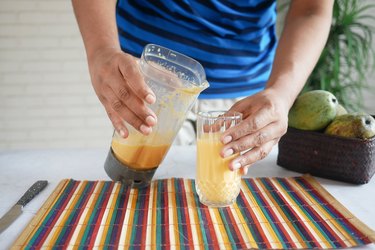
Bowel adhesions (aka abdominal adhesions) are a type of scar tissue in the gastrointestinal (GI) tract that can lead to potentially dangerous bowel obstructions. When these adhesions cause symptoms, you may be asked to take measures to ease the digestion process.
During certain times, eating cooked and soft, mashed foods (while avoiding insoluble fiber) can help when you have bowel adhesions because these foods flow through the GI tract more easily. This may help prevent a bowel obstruction, which requires medical treatment right away.
Video of the Day
Video of the Day
Always work with your doctor to define when and how long it's appropriate to use this dietary approach. "If you know you have bowel adhesions and they become symptomatic, the first thing to do is start a clear liquid diet and call your doctor," says Elena A. Ivanina, DO, MPH, a gastroenterologist at Lenox Hill Hospital in New York City.
In terms of dietary changes: "It is indicated during symptomatic periods," Dr. Ivanina says. "Adhesions are usually not continuously causing symptoms but tend to 'flare,' sometimes triggered by a certain [food] or just randomly. After discussing flare symptoms with a doctor to evaluate for further care, usually dietary changes are the next step when riding out the symptoms is an appropriate plan of action."
The issue doesn't affect everyone. "Abdominal adhesions develop in more than 9 out of 10 people who have surgery with an open abdomen, but a majority of these people do not develop symptoms or complications and therefore do not require a special diet," Dr. Ivanina says.
Read more: What to Do About a Small Bowel Obstruction
What Are Bowel Adhesions?
Bowel adhesions are abnormal scar tissue bands that develop between two structures that are not supposed to be bound together, according to the Cleveland Clinic. This most often occurs as a result of surgery.
"After surgery or inflammation in your abdomen or pelvis, it is very common to develop adhesions to the bowel," Dr. Ivanina says.
"This scarring may tether the bowel and restrict its movement," she says, which can in turn obstruct your intestines. "It is very important to understand that bowel obstruction can be very dangerous, especially a complete obstruction," she says.
Symptoms of Bowel Adhesions
Bowel adhesions do not always have symptoms, and most people don't get them. The most common sign is chronic abdominal pain, according to the National Institute of Diabetes and Digestive and Kidney Diseases (NIDDK).
"Usually, crampy gas pains and bloating are early symptoms, and nausea, vomiting, constipation and inability to pass gas may mean an obstruction is evolving," Dr. Ivanina says.
Symptoms of bowel obstruction may also include the following, per the NIDDK:
- Bloating
- Constipation
- Not passing gas
- Nausea
- Vomiting
When a bowel obstruction interferes with the flow of blood to the blocked portion of the intestines or leads to peritonitis (inflammation of the membrane lining the inner abdominal wall), other symptoms such as fever or increased heart rate may occur, according to the NIDDK. If you're experiencing these symptoms, get medical attention right away.
Diet Changes for Bowel Adhesions
If your doctor recommends a change in diet to alleviate symptoms, this may include eating low-roughage foods and restricting insoluble fiber, Dr. Ivanina says.
According to the U.S. National Library of Medicine, you may need to avoid these high-fiber foods during a flare-up:
- Vegetables
- Whole-wheat and whole-grain products
- Wheat bran
"This aims to reduce the risk of developing a blockage by eating foods that more easily pass an area in the bowel that is narrow or less mobile," Dr. Ivanina says.
"The other dietary considerations are to cook food and avoid raw food, as well as mash, blend or finely shred food to make it more likely to pass easily," she adds.
Keep in mind these dietary changes are done temporarily, based on the advice of your doctor.
Emergency Care for Bowel Obstructions
Other steps you should take depend on whether obstructions have formed in your abdomen, according to Dr. Ivanina.
"If after speaking with your doctor you decide on dietary management and it does not help, then you need to seek further medical care," she says. "These blockages are commonly treated in the emergency room."
Is this an emergency? If you are experiencing serious medical symptoms, please see the National Library of Medicine’s list of signs you need emergency medical attention or call 911.